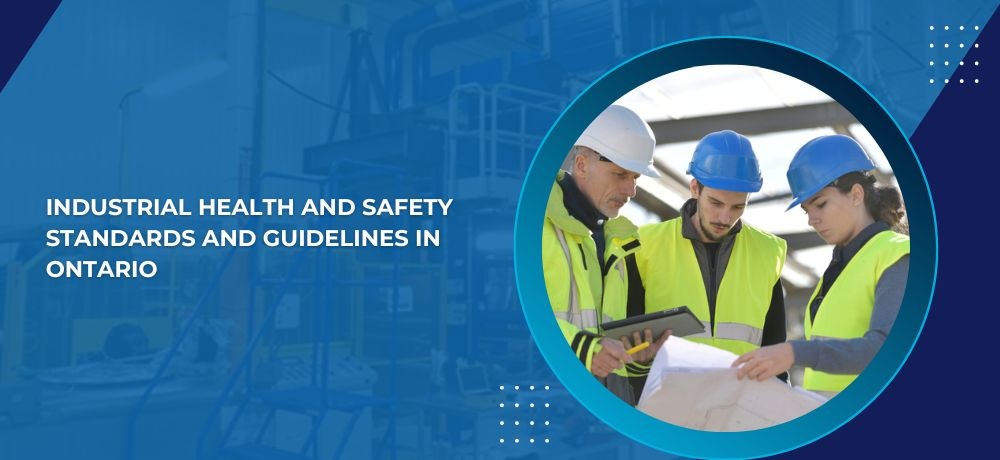Industrial Health and Safety Standards and Guidelines in Ontario
- RTR Engineering
Categories: Health and Safety Standards industrial safety Ontario Regulations workplace safety

Ontario is one of the most industrialized provinces in Canada, with a significant portion of its workforce employed in various industries such as manufacturing, construction, and mining. With the inherent risks associated with these industries, it is essential to ensure that they adhere to industrial health and safety standards and guidelines. So RTR Engineering has provided detailed five points explaining the key standards and guidelines related to industrial health and safety in Ontario and how they ensure the well-being of workers.
1. Occupational health and safety act (OHSA)
The Occupational Health and Safety Act (OHSA) is a primary law that governs workplace health and safety in Ontario. It sets out the rights and responsibilities of employers, supervisors, and workers regarding workplace health and safety. The Act covers a broad range of health and safety issues, including workplace hazards, safety training, safety policies and procedures, joint health and safety committees, and workplace accident investigation and reporting.
2. Workplace hazardous materials information system (WHMIS)
The Workplace Hazardous Materials Information System (WHMIS) is a national system designed to protect workers by providing information about hazardous materials in the workplace. In Ontario, the WHMIS system is regulated by the Occupational Health and Safety Act and the WHMIS Regulation. Employers are required to identify and label hazardous materials, provide safety data sheets and training to employees, and maintain appropriate documentation.
3. Canadian standards association (CSA) standards
The Canadian Standards Association (CSA) is a non-profit organization that develops standards and guidelines for various industries, including health and safety. In Ontario, CSA standards are recognized as best practices for many areas, including electrical safety, machine guarding, and fall protection. Compliance with CSA standards ensures that employers are providing a safe and healthy workplace for their employees. Employers who implement CSA standards can benefit from reduced workplace accidents and injuries, improved employee morale, and increased productivity.
4. Workplace safety and insurance board (WSIB)
The Workplace Safety and Insurance Board (WSIB) is an essential component of Ontario’s industrial health and safety standards and guidelines. The WSIB is an independent agency that administers the workers’ compensation system in Ontario. The board provides compensation and support to workers who suffer from work-related injuries or illnesses, ensuring that workers receive the medical treatment and support they need to recover and return to work. The WSIB also plays an important role in promoting workplace health and safety through prevention programs, education, and research.
5. Ministry of labor, training, and skills development (MLTSD) guidelines
The Ministry of Labour, Training and Skills Development (MLTSD) is another critical organization that plays a crucial role in setting industrial health and safety standards and guidelines in Ontario. The MLTSD is responsible for administering and enforcing the Occupational Health and Safety Act (OHSA) and other related regulations. In addition to enforcing regulations, the MLTSD also develops and publishes guidelines on a range of health and safety issues. These guidelines provide practical advice and recommendations to help employers and workers comply with the OHSA and other regulations.
If you’re looking for an industrial safety engineering and consulting company, consider reaching out to RTR Engineering. A Pre-Start Health & Safety Review (PSR or PHSR) is a machine safety compliance review for equipment or processes being installed or modified in a manufacturing environment, prior to its commissioning at the user’s location. A PSR is required in Ontario by Section 7 of Regulation 851 - Industrial Establishments, of the Occupational Health and Safety Act (S.7 of O.Reg. 851), under 8 specific circumstances, to be performed by an Ontario Licensed Professional Engineer. The review is typically done at the final manufacturing location, however a preliminary review at the machine manufacturer’s location, before installation, can be advantageous as changes or modifications are more easily fabricated and integrated.
Serving clients across Toronto, Brampton, Mississauga, Hamilton, Kitchener, Guelph, Stratford, London, Kingston, Ottawa, Sarnia, Windsor, Oshawa, and the surrounding areas.
Get in touch with us today!
To learn more about our services, please click here. To get in touch with us, please click here or
call us at (519) 577-7898 or email us at [email protected].